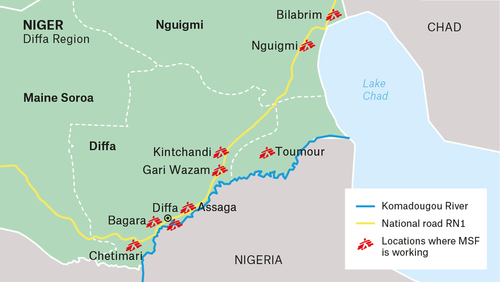For more than three years, the ongoing conflict between Boko Haram and the armies in the Lake Chad region has taken a heavy toll on civilian populations. Many have fled their homes and left everything behind to find refuge in other villages and eventually across borders. In Diffa, which is in south-eastern Niger and borders Chad and Nigeria, there are more than 240,000 displaced people according to the authorities, the majority of whom have been driven from one place to another because of violence.
The consequences of an ongoing conflict
Despite relative calm and no major displacements for the past few months, the situation in Diffa remains extremely volatile. Sporadic attacks by Boko Haram and military operations have kept people on the move, seeking safety and hoping for peace. Garba, who works as a watchman for MSF in Garin Wazam – a site for displaced people located 58km from Diffa town – recalls the number of places he has passed through in the last three years. “After I left my village in Cameroon, I moved about 15 times. First to Nigeria then to Niger; I had to leave one place after the other due to repeated attacks”. Garba is one of many people in Diffa who has experienced the devastating consequences of this conflict.
The pressure on the host communities has also dramatically increased. An estimated 100,000 people now live in a situation of extreme vulnerability as they lack food, water, proper sanitation infrastructure, and access to natural resources. The conflict has also impacted agricultural and livestock activities around the Komadougou River, at the border with Nigeria, and on the shores of Lake Chad, taking away a very important source of socio-economic activities from these populations. In Diffa, the security measures put in place by the authorities because of the conflict have also been wreaking havoc on commercial activities. Trading goods such as fish and some vegetables is forbidden, as is travelling by motorcycle. Both activities are important to earning a living.
Medical care for the most vulnerable
Despite the presence of a large number of humanitarian actors in Diffa, a lack of management and coordination has led to many basic needs being unmet. Families living in sites for displaced people struggle to access sufficient water, food, and sanitary infrastructures.
Distances and security measures are making access to healthcare a daily challenge, and people are also being charged for medical consultations, laboratory tests, and medicines. Highly vulnerable people cannot afford to pay for these services.
MSF is therefore supporting primary, reproductive, and mental health care, together with vaccination and nutritional screening activities in eight health centres in the districts of Diffa, Bosso and Nguigmi.

MSF’s presence can make a difference to the most vulnerable, both displaced and local populations. “Toumour is 80km from Diffa town and has become isolated due to the conflict. As a result, people there lack food, water and work. However, on average around 3,900 people per month benefit from medical consultations we are providing for free in the health centre, together with the health authorities”, explains Audace Ntezukobagir, emergency coordinator for MSF in Diffa.
Respiratory infections and hepatitis E
Acute respiratory infections account for a large number of outpatient medical consultations, especially during the first months of the year. They are particularly prevalent in women and children. “This is clearly linked to the arid climate of the region, especially during the dry season, and the poor living conditions of our patients. People also suffer from diarrhoea, which is partially explained by the poor quantity and quality of the water available”, said Audace Ntezukobagir.
It still remains for the authorities and the humanitarian actors in the region to provide adequate water and sanitation infrastructure to the displaced populations. This need was recently highlighted by the recent outbreak of hepatitis E.
Mental health support
The vast majority of the displaced people in Diffa have experienced very traumatic situations linked to conflict. MSF is currently supporting them by providing individual mental health consultations, psycho-education sessions, as well as support at community level. Group sessions also started at the beginning of this year. “Our group sessions are composed of displaced and refugee women, all victims of the conflict. The discussions aim at breaking isolation, sharing common experiences, and finding solutions together. The main objective is to cope with the distress caused by similar traumatic events”, said Yacoubou Harouna, MSF psychologist in Diffa.
MSF in Diffa
Since the end of 2014, MSF has been working in the Diffa region to assist people fleeing from the violence linked to the presence of the Boko Haram group and military interventions in the area. MSF ensures free medical and psychological assistance in eight health centres of the region. The organisation is also supporting the supply of drinking water, the installation of latrines and the distribution of essential items in various towns and places where displaced people, refugees and returnees have gathered.
In addition, MSF is supporting the Ministry of Health in two hospitals: Nguigmi hospital and the main maternal and paediatric health centre in Diffa town. At both hospitals, MSF is supporting the reproductive and sexual health and paediatric units, and is providing mental health support. At Nguigmi hospital, the team is also treating children with severe acute malnutrition.


